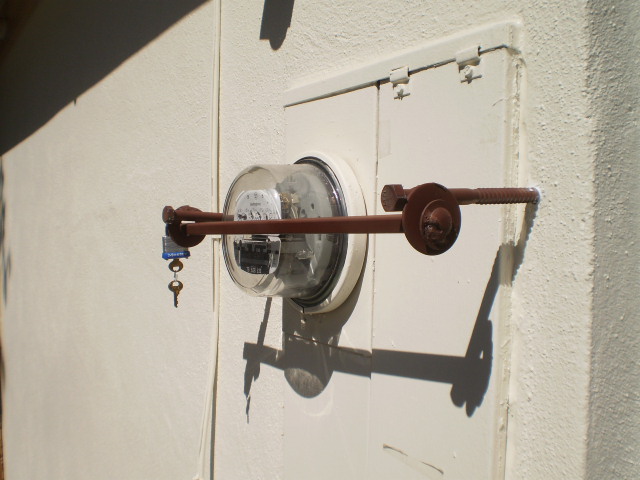This elegant solution to trespassing utility contractors- using steel bars to prevent theft- creates an attractive architectural accent to any home where pulsing microwave meters are not welcome. Allows easy reading by meter readers, while making removal impossible without doing structural damage to the home. Works well for either individual or multiple meters. Remember- you have the right to retain your analog meter, or have your “smart” meter removed from your home if it is making you sick.
More ideas: Page 1; Page 2; Page 3; Page 5












If these meters were good in any of the ways that PG$E says they are, then people would be jumping to get one like we do with other legitimate products that we want.
Few people know all of PG&E’s lies regarding this so-called “smart” meter program.
When you find out one lie, there are ten more and when you find 3 lies, PG&E has delivered 30 more.
PG&E workers are not as vocal as some other people about their comments about PG$E Corporate Management, but quietly after gaining their confidence, they tell some of the worst stories we can imagine.
PG&E Corporate Management – the scum of the Earth (apologies to “Scum” for the association to PG&E Management).
Have you guys seen this?
On behalf of several Maine residents, Skelton, Taintor & Abbott secured a landmark decision that will benefit utility customers throughout the country. Alan Stone, chair of the firm’s energy law group, successfully convinced the Maine Public Utilities Commission (MPUC) to find that it was an unjust and unreasonable practice for Central Maine Power Company (CMP) to refuse to permit residential and small commercial customers to opt-out of CMP’s smart meter program.
Skelton, Taintor & Abbott represented a group of customers in a complaint against CMP, and convinced the MPUC to order CMP to offer customers the option of opting out of the smart meter program and retaining their existing electromagnetic meters. Stone proved that because of unresolved concerns relating to health, privacy and cyber security resulting from the installation of wireless meters on their homes, customers should have a choice concerning the installation of those meters. CMP argued vigorously that customers should not be allowed to opt out, and the MPUC found that position to be unjust and unreasonable.
The Portland Press Herald has described the decision as a “landmark” case that represents the first time any state had ordered an electric utility to permit customers the choice to opt out of a smart meter program. The case has been followed by other Public Utilities Commissions and utility experts around the country, and will serve as precedent for others in the determination of how to resolve what has become a growing debate about customer choice and smart meters.”
http://www.skeltontaintorabbott.net/news/85/77/Skelton-Taintor-Abbott-Wins-Landmark-Smart-Meter-Case.html
Pingback: Defend Your Analog Meter Part V | Stop Smart Meters!
Question:
Does a homeowner have a legal right to put a bar across his analog meter to allow it to be read but not removed? Does this violate any law or legal right of the utility company? If you don’t know, please tell me where I can get that info.
Julie Ross
@Julie We aren’t legal experts, but we and many others in this fight believe you have the basic human right to protect your health, safety, and privacy. Many people have installed such devices against unlawful, unwanted, and unwarranted installation of ‘smart’ meters by utilities. There have been instances of a utility cutting locks or chains, but on the whole this is the number-one recommendation we can make to you or anyone else: DEFEND YOUR ANALOG METER. Here are some ideas how to do so.
The answer to this question is pretty much common sense. It doesn’t take a “legal expert” to figure out that no, you cannot lock up someone else’s property away from them. It would be like you riding your bike to the grocery store and putting your bike in the bike rack, only to come back to find that the owner of the store has installed his own lock on your bike. Obviously not legal. Your bike may be on their property, but that doesn’t make it their bike to do with what they please. Exact same thing goes for gas and electric meters meters. They are company owned and not part of your house.
Sir, you are mistaken. Let’s say someone leaves a bike on your property that spies on you, may cause your house to burn down, and emits RF radiation pulses into your living space with out permission. I would likely not just lock up that bike, but take a sledgehammer to it, if the owner did not remove the bike within a specified time period.
I’m not mistaken. Her question was, “is it legal to lock up your meter”? The answer is no, it’s not yours. The option is that you don’t have to have a meter. Of course that means you won’t have service either, but it’s totally up to you.
I think the more important question is actually, is it legal for a (monopoly) utility company to force a meter that carries serious risks, onto your property, against your will, when the so-called “free market” does not allow competition in most cases. Though many utility company executives, and apparently yourself, would disagree, forcing meters and disconnecting service directly violates key sections of the US Constitution including the 4th amendment, and many other international legal agreements. If the utility company fails to remove an unauthorized meter, after notice, then they are in violation of trespass. The fact that state regulated utilities have an obligation to continue to provide service with an analog meter has been affirmed by states including California, Vermont, and many others– all listed at https://stopsmartmeters.org/2016/03/28/guide-to-north-american-smart-meter-policies/